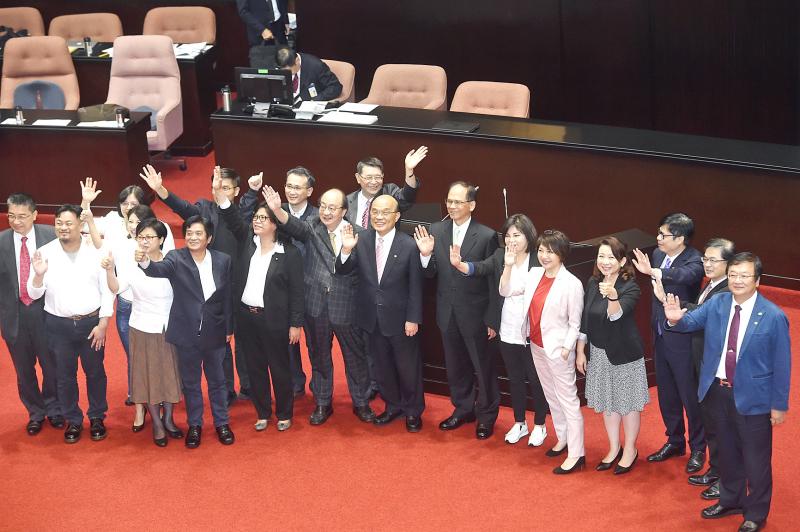With the previous legislative session having drawn to a close on Friday, legislative caucuses are eyeing a provisional legislative session to review urgent bills and President Tsai Ing-wen’s (蔡英文) nominations for independent agencies.
A provisional legislative session should be held late next month before or after the Dragon Boat Festival holiday, Democratic Progressive Party (DPP) caucus secretary-general Chung Chia-pin (鍾佳濱) said yesterday.
The DPP caucus hopes to review an irrigation association bill, a bill to introduce a lay judge system for reviewing criminal offenses and the budget for the second stage of the Forward-looking Infrastructure Development Program, in addition to approving the president’s National Communications Commission and Examination Yuan member nominations, Chung said.

Photo: Chien Jung-fong, Taipei Times
If lawmakers decide to hold an extraordinary session, the DPP caucus would respect the opinions of opposition caucuses regarding what items to deal with, he added.
The Chinese Nationalist Party (KMT) caucus neither favors nor opposes an extraordinary session, but believes that some bills could wait until the next regular session, KMT caucus whip Lin Wei-chou (林為洲) said, adding that, as a minority, the KMT caucus can only passively respond to the DPP’s proposals.
If an extraordinary session is called, the KMT caucus believes that lawmakers should review its proposal to amend the Special Act on COVID-19 Prevention, Relief and Recovery (嚴重特殊傳染性肺炎防治及紓困振興特別條例) so that the government could legally give people a NT$6,000 cash handout as the pandemic eases domestically, he said.
The KMT caucus would like to ask Tsai to report to the Legislative Yuan on cross-strait relations and proposed constitutional amendments, and discuss how the Act Governing Relations With Hong Kong and Macau (香港澳門關係條例) could be amended to help Hong Kongers seeking asylum, as Beijing seeks to ram through a national security bill for the territory, he said.
Taiwan People’s Party (TPP) caucus whip Lai Hsiang-ling (賴香伶) said that it would be appropriate if an extraordinary session is held in two weeks.
In addition to reviewing the act and its enforcement guidelines, the TPP caucus also hopes to review its proposal to amend the Legislators’ Conduct Act (立法委員行為法), which seeks to remove any lawmakers who have been convicted or have committed offenses related to national security, she said.
Due to the plethora of nominations and bills that need to be reviewed, the New Power Party (NPP) caucus believes that an extraordinary session should be called as soon as possible, NPP caucus whip Chiu Hsien-chih (邱顯智) said.
If caucuses decide to review the bill on the proposed lay judge system, they should consider it along with the NPP caucus’ bill to introduce a jury system for reviewing criminal trials, he said.

The manufacture of the remaining 28 M1A2T Abrams tanks Taiwan purchased from the US has recently been completed, and they are expected to be delivered within the next one to two months, a source said yesterday. The Ministry of National Defense is arranging cargo ships to transport the tanks to Taiwan as soon as possible, said the source, who is familiar with the matter. The estimated arrival time ranges from late this month to early next month, the source said. The 28 Abrams tanks make up the third and final batch of a total of 108 tanks, valued at about NT$40.5 billion

Two Taiwanese prosecutors were questioned by Chinese security personnel at their hotel during a trip to China’s Henan Province this month, the Mainland Affairs Council (MAC) said yesterday. The officers had personal information on the prosecutors, including “when they were assigned to their posts, their work locations and job titles,” MAC Deputy Minister and spokesman Liang Wen-chieh (梁文傑) said. On top of asking about their agencies and positions, the officers also questioned the prosecutors about the Cross-Strait Joint Crime-Fighting and Judicial Mutual Assistance Agreement, a pact that serves as the framework for Taiwan-China cooperation on combating crime and providing judicial assistance, Liang

A group from the Taiwanese Designers in Australia association yesterday represented Taiwan at the Midsumma Pride March in Melbourne. The march, held in the St. Kilda suburb, is the city’s largest LGBTQIA+ parade and the flagship event of the annual Midsumma Festival. It attracted more than 45,000 spectators who supported the 400 groups and 10,000 marchers that participated this year, the association said. Taiwanese Designers said they organized a team to march for Taiwan this year, joining politicians, government agencies, professionals and community organizations in showing support for LGBTQIA+ people and diverse communities. As the first country in Asia to legalize same-sex

MOTIVES QUESTIONED The PLA considers Xi’s policies toward Taiwan to be driven by personal considerations rather than military assessment, the Epoch Times reports Chinese President Xi Jinping’s (習近平) latest purge of the Chinese People’s Liberation Army (PLA) leadership might have been prompted by the military’s opposition to plans of invading Taiwan, the Epoch Times said. The Chinese military opposes waging war against Taiwan by a large consensus, putting it at odds with Xi’s vision, the Falun Gong-affiliated daily said in a report on Thursday, citing anonymous sources with insight into the PLA’s inner workings. The opposition is not the opinion of a few generals, but a widely shared view among the PLA cadre, the Epoch Times cited them as saying. “Chinese forces know full well that